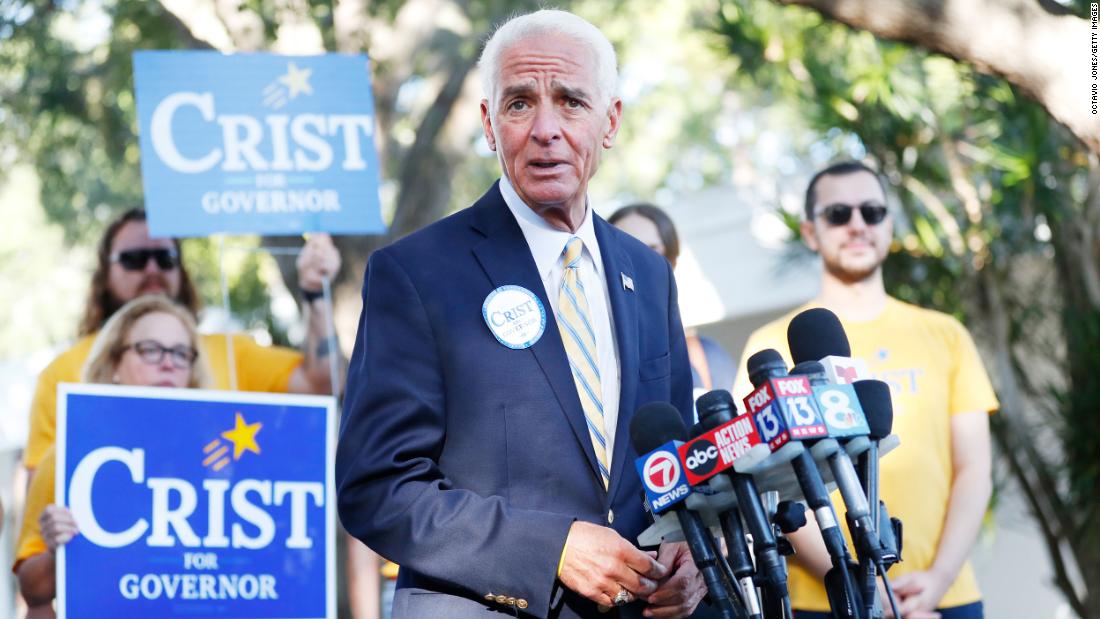
“This guy wants to be President of the United States of America,” Crist said in his victory speech. “However, when we defeat him on November 8, that show is over.”
Crist’s argument against another four years of DeSantis is also predicated on Floridians longing for a less divisive tone from its leader. Throughout the Democratic primary, Crist and Fried depicted DeSantis as a bully and a despot who is far more focused on positioning himself to run for the White House than he is on governing the country’s third largest state. Time and again, they have noted, DeSantis has forced the state’s other branches of government to bend to his will, eliminating any checks on his executive power.
Earlier Tuesday, DeSantis predicted he would face Crist in the general election. During a news conference in Tallahassee, he dismissed Crist as “a guy that’s been running for office for five decades, who is voting with (Joe) Biden 100% of time,” and he made clear he intends to frame the race around his controversial coronavirus pandemic response.
Crist, he said, “opposed every decision I’ve made to keep this state open, to keep people’s rights, respected their rights, to save jobs, to keep kids in school, to save businesses.”
Inside his St. Petersburg watch party, Crist did not have to wait long for good news. By the time his campaign welcomed supporters into the Hilton conference room just after polls closed at 7 p.m., early voting returns strongly suggested it would be a drama free night. The crowd broke into cheers as a large screen displayed an overwhelmingly promising start to the count for Crist.
A repeat of the Biden playbook?
In choosing Crist, Democrats are betting a well-known and inoffensive nominee gives them the best chance to unseat a divisive but dynamic incumbent Republican. It’s a playbook nearly identical to the one deployed successfully by Biden to defeat Trump in 2020.
“I’ve known him. I’ve met him. I trust him,” Darla Price, a retiree from St. Petersburg, told CNN after she voted for Crist.
However, the Biden blueprint notably did not work in Florida. Trump won the state by a larger margin in 2020 than he did in 2016. Crist himself hasn’t won a statewide general election in Florida in 16 years, though he has repeatedly tried.
After decades as a Republican — serving as a state lawmaker, education commissioner, attorney general and reaching the governor’s office in 2007 — Crist fell out of favor with his party for committing the cardinal sin of hugging a Democratic president, Barack Obama. He was defeated in a 2010 Republican primary for Senate by Marco Rubio and then lost in the general election as an independent.
But four years later he reemerged as the Democratic nominee to go up against his successor, then-Gov. Rick Scott. Crist fell 64,000 votes short of winning back his old job. In 2016, he then turned his attention to the House of Representatives and was thrice elected as a Democrat to represent his home in Pinellas County.
But as Fried struggled to make a case for her candidacy, Crist’s campaign gained traction. He built a coalition of supporters throughout the state and across the party’s factions: labor unions, environmental groups, Black faith leaders, prominent women leaders and elected officials of all stripes. Popular Democratic lawmakers like state Rep. Anna Eskamani and state Sen. Shevrin Jones, who were initially dismissive of Crist, endorsed him over Fried.
Most primary voters were ultimately unconvinced.
Shortly after the polls closed in the Florida Panhandle at 8 p.m., Fried told her supporters in Fort Lauderdale that she had called Crist to congratulate him on winning the nomination. She strongly hinted this isn’t the end of her time in the Florida political arena.
“Nobody ever broke a glass ceiling on the first pitch,” Fried said.
